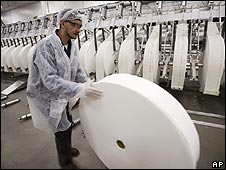US budget deficit seen at $438bn

Economic weakness could presage a recession, the CBO warns
|
The US budget deficit is expected to reach a record $438bn in 2009, according to estimates from the Congressional Budget Office (CBO).
It also warns the deficit could go higher as the figure does not take into account possible government costs for taking over Fannie Mae and Freddie Mac.
The CBO added the US government will run a deficit of $407bn this year.
During the next fiscal year – starting on 1 October – a “turbulent” economy would cut revenues, the CBO warned.
‘Increase in spending’
The CBO estimate for 2009 does not include the possible costs of rescuing the two stricken giant mortgage firms, which was announced on Sunday.
Its assessment of $438bn would breach the 2004 record of $413bn and far outstrip the $161bn budget shortfall last year.
“The significant expansion in the deficit is the result of a substantial increase in spending and a halt in revenue growth,” the CBO report said.
In 2008, the CBO estimates, federal spending will be 8.3% higher than it was in 2007; at the same time, total revenues will be less than they were in 2007.
‘Past recessions’
At a news conference, CBO director Peter Orszag said it was too soon to say whether the US officially is in a recession.
But he said that the recent rise in unemployment and economic weakness “are consistent with the pattern seen in past recessions, the past few recessions to be precise”.
He also said CBO’s budget estimates did not take into account possible costs related to the US government for taking over Fannie and Freddie.
But he said the cost of the operation should be directly incorporated into the federal budget, which could further swell deficits.

